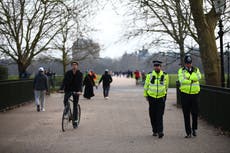Anger as No 10 tells residents hit by cladding scandal not to ‘slow things down’ by campaigning for help
Showdown in Commons averted – but Lords set to vote to protect all leaseholders from the costs of making homes safe
Your support helps us to tell the story
From reproductive rights to climate change to Big Tech, The Independent is on the ground when the story is developing. Whether it's investigating the financials of Elon Musk's pro-Trump PAC or producing our latest documentary, 'The A Word', which shines a light on the American women fighting for reproductive rights, we know how important it is to parse out the facts from the messaging.
At such a critical moment in US history, we need reporters on the ground. Your donation allows us to keep sending journalists to speak to both sides of the story.
The Independent is trusted by Americans across the entire political spectrum. And unlike many other quality news outlets, we choose not to lock Americans out of our reporting and analysis with paywalls. We believe quality journalism should be available to everyone, paid for by those who can afford it.
Your support makes all the difference.No 10 has angered residents facing massive bills to remove cladding by claiming their campaign for help will “slow things down” for other people hit by the scandal.
The row blew up as a showdown in the Commons was averted – but with the Lords set to vote within days to protect all leaseholders from the costs of making their homes safe from fire.
An amendment tabled by Tory rebels did not reach a vote for procedural reasons, but will be retabled when the Lords debates the Fire Safety Bill on Friday.
It would plug gaps in a £3.5bn package that provides no funds for other safety defects revealed when cladding is removed – and forces leaseholders in shorter buildings to pay £50-a-month to repay loans for repairs.
But, asked about the amendment, Boris Johnson’s press secretary claimed: “Far from speeding things up for constituents across the country who are worried about finding themselves in these properties, it would actually slow things down.”
The comment sparked fury from the End Our Cladding Scandal campaign, which said it exposed the government’s “shocking lack of knowledge” about the controversy.
“Ministers have waited for more than three years after the Grenfell tragedy before introducing the Fire Safety Bill,” said spokesperson Giles Grover.
“For nearly four years, leaseholders have been forced to pay the ruinous costs of waking watches, soaring insurance and fire safety remediation forced upon them.”
In the Commons, ministers were warned they could not continue to dodge the anger provoked, one Tory MP, Stephen McPartland, saying: “We’ll be back to discuss this later on.”
A second, Royston Smith, urged his fellow Conservatives not to “abandon thousands of their constituents”. He said: “I know this: they will not forget and they will not forgive.”
And Sarah Jones, Labour’s policing and fire spokesperson, said: “It beggars belief that, after dragging their feet for four years, the Tories are hiding behind Parliamentary process to avoid taking action on dangerous cladding.”
MPs reversed a Lords amendment to prevent building owners from passing on the costs of replacing cladding, or other repairs, to leaseholders and tenants.
Kim Malthouse, a home office minister, insisted the Building Safety Bill – not the Fire Safety Bill – was the appropriate legislation for resolving who should pay up, and how.
However, he admitted he could not “prejudge the time Parliament will need to properly scrutinise this important piece of legislation before it’s on the statute book.”
The £3.5bn top-up to an existing building safety fund will finally remove and replace cladding on all buildings above 18 metres only.
But millions of people are believed to live in cladded flats when those living in buildings of under 18 metres are included – where residents also face problems protecting and selling their homes.
Some lenders are refusing to offer mortgages on properties, insurance premiums have soared and some homeowners fear potential bankruptcy.
Subscribe to Independent Premium to bookmark this article
Want to bookmark your favourite articles and stories to read or reference later? Start your Independent Premium subscription today.





Join our commenting forum
Join thought-provoking conversations, follow other Independent readers and see their replies
Comments